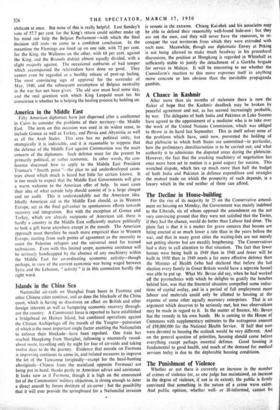The Decline in House-building
For the rise of its majority to 25 on the Conservative amend- ment on housing on Monday, the Government was mainly indebted to the Liberals, six of whom opposed the amendment on the not very convincing ground that they were not satisfied that the Tories, if they had the chance, would do better than Labour had done. The plain fact is that it is a matter for grave concern that houses are being erected at so much lower a rate than in the years before the war, and that in many great cities the waiting-lists are not merely not getting shorter but are steadily lengthening. The Conservatives had a duty to call attention to that situation. The fact that fewer houses were being built in 1949 than in 1948 and fewer will be built in 1950 than in 1949 needs a far more effective defence than the Minister of Health (who had declared that before the last election every family in Great Britain would have a separate house) was able to put up. What Mr. Bevan did say, when he had worked off the pyrotechnics with which he delights to gratify the benches behind'him, was that the,financial situation compelled some reduc- tions of capital outlay, and in a period of full employment more labour and materials could only be allotted to housing at the expense of some other equally necessary enterprises. That is an argument which deserves to be seriously met, but two observations may be made in regard to it. In the matter of finance, Mr. Bevan has the remedy in his own hands. He is coming to the House of Commons with supplementary estimates to the outrageous amount of £98,000,000 for the National Health Service. If half that sum were devoted to housing the outlook would be very different. And on the general question of priorities, housing should come before everything except perhaps essential defence. Good housing is fundamental to good health, and much of the demand for medical services today is due to the deplorable housing conditions.


































 Previous page
Previous page